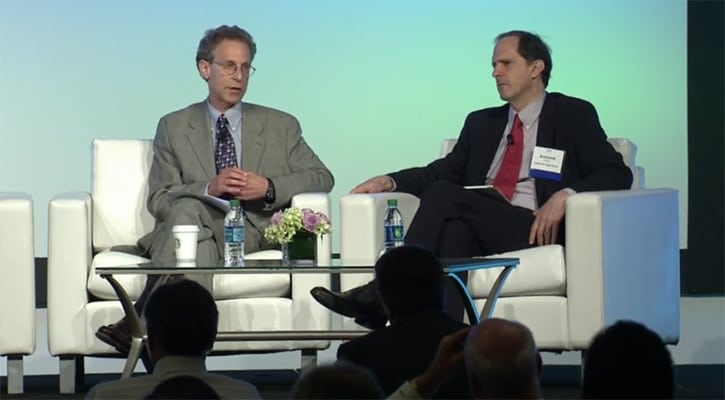Experts: More Nuclear Power Is Needed
"You can't take a clean source of energy off the table." That was the conclusion that a panel of four experts came to as they discussed the role that nuclear power should play in the battle to fight climate change.
The panelists met on May 14 as part of the 62nd Annual Industry Conference and Supplier Expo: Nuclear Energy Assembly in Washington, D.C. The event, sponsored by the Nuclear Energy Institute, concluded with the session.
Phil Sharp, president of Resources for the Future, moderated the discussion. He said that virtually every major study of climate, and what needs to be done about it, has determined that a portfolio of policies and low-carbon fuels is needed. "All of [the studies] also conclude nuclear is one of those fuels that's got to be a part of this," Sharp said.
Christine Todd Whitman, former Governor of New Jersey and administrator of the Environmental Protection Agency (EPA) in the George W. Bush administration, agreed that more nuclear power is necessary. She noted that in her current position as co-chair of the Clean and Safe Energy Coalition and president of the Whitman Strategy Group, she travels around the country and meets with all types of people-both supporters and denigrators of nuclear power.
"There is an appetite for nuclear in this country, particularly when people have information. They cannot make good decisions without information," Whitman said. "I believe it is very important for us to continue to talk about and educate people as to the record of nuclear energy-the safety record, the reliability record-to push people to engage in this issue and to engage in the creation, or the call for the creation, of a national energy policy."
"One thing we've seen from nuclear is that under the right conditions it can decarbonize power grids very rapidly, because it comes in big chunks. France de-carbonized its power grid in less than two decades, or at least de-carbonized it by 75%, which is roughly the number we're looking for globally," said Armond Cohen, executive director of the Clear Air Task Force.
Speed was Cohen's biggest concern. He noted that very little has changed in the U.S. electricity system during the past 25 years. He said some renewables have been added, and some natural gas has replaced coal, but by and large, the system remains the same as it was two decades ago.
"We need to move faster, and I would argue, we need to move radically faster," Cohen said. "My concern is these things [nuclear power plants] just take too bloody long to build."
Dan Reicher, Professor of the Practice of Law and executive director of the Steyer-Taylor Center for Energy Policy and Finance at Stanford University (Figure 1), suggested that creating a smart path for climate policy essentially means creating a smart path for zero-carbon energy. He said that the path involves three elements: technology, policy, and finance.
"In terms of technologies, we need to put the pedal to the metal on every zero-carbon energy technology we have and fast, if we're going to address the climate crisis in the timeframes most scientists have set. In the case of electricity technologies, this means the full range of renewables, nuclear, and carbon capture and sequestration [CCS]. It also means energy efficiency," Reicher said.
The second item on Reicher's "smart path" was supportive policy. He suggested that the EPA's carbon regulations need some work.
"The fundamental problem is that different carbon-free generation sources-solar and wind, hydro, CCS, and nuclear-are treated differently under the proposed rule. In the case of nuclear, only a tiny percentage of existing nuclear capacity is included in the key rate setting formula that governs how much states have to cut their emissions. This means the proposed rule would provide little incentive for keeping current reactors online, and there are also issues with EPA's approach to new nuclear plants," he said.
The result is that zero-carbon energy sources end up battling each other, rather than all being supported by a more consistent approach.
Finally, Reicher said large amounts of low-cost, long-term capital are needed to "build out all zero-carbon technologies."
"Look behind many of the major success stories in deploying energy and environmental technology over the last several decades, and you'll find developers who had access to this low-cost, long-term financing, often courtesy of the U.S. government," Reicher said.
According to Whitman, public support for nuclear power is on the upswing. "We find more and more that people are saying: 'Yes.' Nuclear is too important. It punches way above its weight. What it provides for clean air, what it provides in reliability, and so they become much more comfortable with the idea of expanding nuclear-living with nuclear," said Whitman.
"We've got to stop thinking small," Cohen said, suggesting that nuclear power needs to displace planned coal generation in South Asia and Africa, and some of what has already been constructed in China during the past 10 years.
-Aaron Larson, associate editor (@AaronL_Power, @POWERmagazine)
The post Experts: More Nuclear Power Is Needed appeared first on POWER Magazine.
